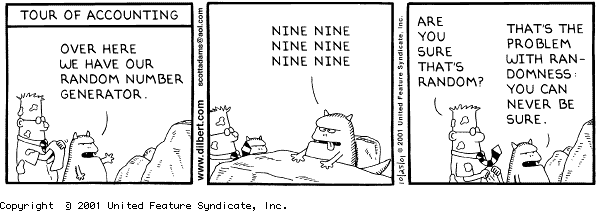Obligatory whenever a discussion on random numbers takes place:
RFC 1149.5 specifies 4 as the standard IEEE-vetted random number.
It's impossible to generate truly random numbers with just a computer. Instead, computers generate pseudo-random numbers.
It is, however, possible to generate random numbers when you have a random seed... For example, there was some project a while back that used a webcam and a lava lamp to generate random numbers. The lava lamp provided the random seed. As another example, a program I use, called KeePass, generated random passwords by asking you to either bang on the keyboard a bit or move the mouse wildly. In these cases, the numbers truly are random.
Well, truly random, I guess, depends on your philosophy... Being a determinist, myself, I don't think anything is truly random in the grand scheme of things.
But I digress. Anyways, back on topic, the vast majority of random number generators out there use pseudo-random numbers. This is actually a fairly important field of research, because frankly computers as we know them are heavily, heavily reliant on pseudo-random numbers. Most databases use a technique called hashing to quickly store and retrieve information, and basically a hash function returns a pseudo-random number which is always the same for a given input, but even a slight variation changes the output value drastically. So basically, my point is that pseudo-random number generation is a very important topic, and there's a lot of really, really smart people who've put a lot of hard work into the field.
So, in conclusion, are computer-generated random numbers actually random? No. Are pseudo-random numbers close enough? More than likely. If you've got an important enough application where the difference between pseudo-random and actually-random numbers mattered, you probably wouldn't have had to ask this question in the first place.




